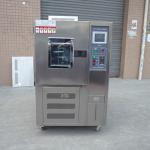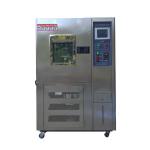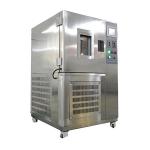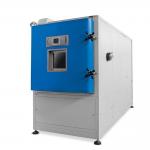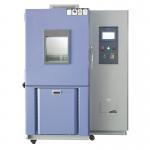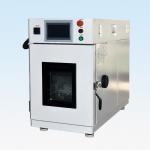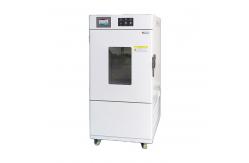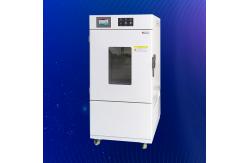In the modern era of materials science and product development,
understanding the impact of ultraviolet (UV) radiation is of utmost
significance. The Customized UV Climatic Chamber is a revolutionary
tool that allows for precise simulation and analysis of UV
exposure, catering to a wide range of industries. This state-of-the-art chamber is designed to replicate various UV
radiation conditions that products may encounter in real-world
scenarios. It serves industries such as automotive, aerospace,
plastics, coatings, and textiles. The primary objective is to
evaluate how materials and products respond to UV light over time,
including effects like color fading, material degradation, loss of
mechanical properties, and chemical changes. By subjecting samples
to controlled UV environments, manufacturers and researchers can
make informed decisions about material selection, product design,
and durability enhancements. - Durable and Light-Tight Construction
- The chamber is constructed with a high-strength alloy framework
that provides stability and durability. The interior is lined with
a highly reflective and UV-absorbing material to ensure maximum
utilization of the UV light source and prevent any unwanted
reflections or stray radiation. The door is engineered with a
multi-seal mechanism, incorporating a UV-resistant gasket and a
secure locking system, maintaining a light-tight and controlled
testing environment. The chamber also features a small viewing
window made of UV-blocking glass, allowing for visual inspection
without compromising the integrity of the test.
- Precision UV Emission and Control Systems
- UV Source: Equipped with a high-intensity UV lamp array that can
emit UV radiation across a wide spectrum, typically ranging from
UVA (315-400nm) to UVC (100-280nm). The lamps are carefully
calibrated and monitored to ensure consistent and accurate UV
output. The power and intensity of the UV emission can be precisely
controlled, allowing for the simulation of different environmental
UV levels, from mild sunlight exposure to intense industrial UV
curing conditions.
- Spectral Control: The chamber incorporates a spectral filter system
that enables the selection and adjustment of specific UV
wavelengths. This is crucial for testing the effects of different
UV bands on materials. For example, UVA is often associated with
long-term material aging, while UVC is more germicidal and can
cause rapid chemical changes. The ability to isolate and vary these
wavelengths provides detailed insights into material behavior.
- Intensity and Exposure Time Control: The user-friendly control
panel allows for precise programming of UV intensity levels and
exposure times. The intensity can be adjusted from a few milliwatts
per square centimeter to several watts per square centimeter, and
the exposure time can range from a few minutes to thousands of
hours, replicating short-term product use scenarios as well as
long-term outdoor exposure.
- Advanced Instrumentation and Data Acquisition
- The chamber is outfitted with a comprehensive suite of sensors and
instrumentation. In addition to UV intensity sensors, it includes
sensors for measuring temperature, humidity (as UV exposure can
sometimes interact with moisture to affect materials differently),
and even some chambers can be equipped with sensors for detecting
chemical changes or gas emissions from the tested samples. These
sensors are connected to a state-of-the-art data acquisition system
that records and stores all relevant data. The data acquisition
system offers a high sampling rate, typically ranging from 100 to
1000 samples per second, ensuring that even the most rapid changes
in environmental conditions or sample properties are accurately
captured. The collected data can be accessed and analyzed in
real-time or retrieved later for in-depth studies. The system is
also compatible with industry-specific data analysis software,
enabling the generation of detailed reports and graphical
representations of the test results.
- Safety and Compliance Features
- The Customized UV Climatic Chamber is designed with multiple safety
features. It has an automatic shutdown system in case of any
critical malfunction, such as overheating of the UV lamps or
excessive radiation levels. The chamber is also equipped with a
ventilation system to remove any potentially harmful gases or
vapors that may be generated during the UV-induced chemical
reactions. The control panel is designed with safety interlocks and
clear warning indicators to prevent accidental operation and ensure
the well-being of personnel. Additionally, the chamber complies
with relevant industry standards and regulations regarding UV
exposure testing, ensuring that the testing procedures are reliable
and recognized within the industry.
- Chamber Size and Capacity: The chamber is available in various sizes, from small benchtop
models with a volume of a few liters, suitable for testing small
samples like fabric swatches or plastic components, to larger
floor-standing units with volumes up to several cubic meters,
capable of accommodating larger products or multiple samples
simultaneously. The interior dimensions are optimized for uniform
UV distribution and proper air circulation, ensuring that all parts
of the tested samples receive consistent exposure.
- UV Wavelength Range and Resolution: The UV lamp array can cover a wavelength range from 100nm to
400nm with a resolution of typically ±5nm. This allows for detailed
studies of the effects of specific UV wavelengths on materials. For
example, a resolution of ±5nm enables the differentiation between
the impacts of 320nm and 325nm UV light on a particular polymer,
which could be crucial in understanding its degradation mechanism.
- UV Intensity Range and Accuracy: The intensity of the UV radiation can be adjusted from 0.1 mW/cm²
to 10 W/cm² with an accuracy of ±10%. This wide range and accuracy
are essential for simulating different real-world UV scenarios. For
instance, a low-intensity setting of 0.1 mW/cm² might be used to
mimic the UV exposure in a shaded outdoor area, while a
high-intensity of 10 W/cm² could replicate the conditions in a UV
curing chamber for industrial coatings.
- Temperature and Humidity Range: The chamber can maintain a temperature range from -20°C to +80°C
with an accuracy of ±1°C and a humidity range from 10% to 95% RH
with an accuracy of ±3% RH. These parameters are important as they
can influence the rate and nature of UV-induced changes in
materials. For example, higher humidity levels may accelerate the
degradation of some materials when combined with UV exposure.
- Data Acquisition Rate: The data acquisition system samples sensor data at a rate of 500
samples per second, ensuring that even the slightest and most rapid
changes in UV intensity, temperature, humidity, or other parameters
during the test are accurately recorded and can be analyzed in
detail.
- Compliance with Industry Standards: Complies with standards such as ASTM G154 for UV exposure of
plastics and ISO 4892 for plastics - Methods of exposure to
laboratory light sources, ensuring that the testing is conducted in
a manner consistent with industry best practices and facilitating
the comparison of test results across different laboratories and
manufacturers.
- Accurate Simulation of UV Exposure Environments
- The primary function of this chamber is to provide a highly
accurate and realistic simulation of the UV radiation conditions
that products will face. By precisely controlling UV wavelength,
intensity, and exposure time, along with temperature and humidity,
it allows for the evaluation of how materials and products will
perform and degrade over time. For example, it can determine if a
car's exterior paint will fade and lose its gloss after prolonged
exposure to sunlight, or if a textile used in outdoor furniture
will become brittle and lose its colorfastness. This information is
invaluable for manufacturers to optimize their product designs,
select appropriate UV stabilizers or protective coatings, and
improve the overall durability and appearance of their products.
- The ability to conduct repeatable tests with different UV profiles,
as mandated by industry standards, is also a crucial function. This
helps in comparing the performance of various product versions or
materials and identifying the most suitable option. For instance, a
plastics manufacturer can test multiple formulations of a polymer
under the same set of UV, temperature, and humidity cycling
conditions and analyze the results to select the most UV-resistant
composition.
- Enhanced Product Quality and Innovation
- Through comprehensive testing in the Customized UV Climatic
Chamber, product developers can identify and address potential
issues in their designs. If a material shows signs of degradation
or failure during the test, appropriate measures can be taken, such
as adding UV absorbers, antioxidants, or changing the material's
molecular structure. This leads to the development of more reliable
and durable products, reducing the risk of premature failure and
enhancing customer satisfaction. In the research and development
field, it allows for the exploration of new materials and
technologies, providing valuable data on their behavior under UV
radiation. For example, researchers can study the performance of
new nanocomposites or bio-based materials in UV-rich environments,
opening up new possibilities for sustainable and high-performance
product development.
- The chamber also serves as a powerful tool for quality control. By
subjecting products to standardized UV tests, manufacturers can
ensure that their products meet the required quality and
performance standards. This helps in building a reputation for
quality and reliability in the market, which is essential for
long-term success.
|
